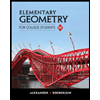Write the letters (a)-(d) in an order that completes an indirect proof of the statement: If n + 6 = 32, then n # 5. (a) But this contradicts the fact that n? + 6 = (b) Our temporary assumption must be false, and it follows that n # 5. (c) Assume temporarily that n = 5. (d) Then n + 6 32. = 31.
Write the letters (a)-(d) in an order that completes an indirect proof of the statement: If n + 6 = 32, then n # 5. (a) But this contradicts the fact that n? + 6 = (b) Our temporary assumption must be false, and it follows that n # 5. (c) Assume temporarily that n = 5. (d) Then n + 6 32. = 31.
Elementary Geometry For College Students, 7e
7th Edition
ISBN:9781337614085
Author:Alexander, Daniel C.; Koeberlein, Geralyn M.
Publisher:Alexander, Daniel C.; Koeberlein, Geralyn M.
ChapterP: Preliminary Concepts
SectionP.CT: Test
Problem 1CT
Related questions
Question

Transcribed Image Text:Write the letters (a)-(d) in an order that completes an indirect proof of
the statement: If n + 6 = 32, then n # 5.
(a) But this contradicts the fact that n? + 6 =
(b) Our temporary assumption must be false, and it follows that n # 5.
(c) Assume temporarily that n = 5.
(d) Then n + 6
32.
= 31.
Expert Solution
This question has been solved!
Explore an expertly crafted, step-by-step solution for a thorough understanding of key concepts.
This is a popular solution!
Trending now
This is a popular solution!
Step by step
Solved in 4 steps

Recommended textbooks for you

Elementary Geometry For College Students, 7e
Geometry
ISBN:
9781337614085
Author:
Alexander, Daniel C.; Koeberlein, Geralyn M.
Publisher:
Cengage,

Elementary Geometry for College Students
Geometry
ISBN:
9781285195698
Author:
Daniel C. Alexander, Geralyn M. Koeberlein
Publisher:
Cengage Learning

Elementary Geometry For College Students, 7e
Geometry
ISBN:
9781337614085
Author:
Alexander, Daniel C.; Koeberlein, Geralyn M.
Publisher:
Cengage,

Elementary Geometry for College Students
Geometry
ISBN:
9781285195698
Author:
Daniel C. Alexander, Geralyn M. Koeberlein
Publisher:
Cengage Learning